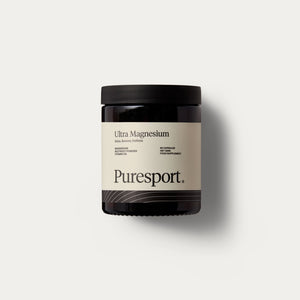Vitamin B12 Ingredient Overview
With lots of different vitamins and minerals necessary for whole-body health, it's important not to forget the significant benefits of different B vitamins. read below to cover all you need to know about vitamin B12 specifically, including how to get vitamin B12 naturally, some of the best vitamin B12 sources, and much more.
What is Vitamin B12?
Vitamin B12 is a B vitamin that is also known as cobalamin, and it is an essential factor in the production of cells and tissues in animals. Vitamin B12 is not required by plants because they use enzymes that don’t rely on B12 to perform the same reactions.
Compared to other vitamins, B12 is extremely complex from a chemical perspective, and it is an essential vitamin that cannot be produced by the human body. B12 is mainly produced by bacteria that are consumed by herbivores, and once they enter the food chain, carnivores are able to get it from their prey.
What is Vitamin B12 Good For?
Red Blood Cell Production
One of the key benefits of vitamin B12 is that it is used to help produce red blood cells. If you’re deficient in B12, your blood cells may not form properly. Typically red blood cells should be round, but if you’re lacking vitamin B12, then your blood cells may come out oval. A lack of red blood cells can lead to anaemia.
When these blood cells widen like this, they’re unable to make their way out of bone marrow as quickly, which means they can’t get into the bloodstream at the proper rate. Anaemia typically causes problems like weakness and fatigue because of a lack of oxygen in your organs.
Reduces the Risk of Birth Defects
Vitamin B12 also plays a key role in ensuring that pregnancy progresses as smoothly as possible. When pregnant, a mother transfers B12 from her system to the foetus so that its brain and nervous system can develop smoothly. B12 is required from the very start of the pregnancy to ensure that birth defects don’t occur.
A lack of B12 can also lead to miscarriages or premature birth. Studies have shown that women with low levels of B12 are three times more likely to give birth to children with birth defects. Women with extremely low levels of vitamin B12 had the risk factor increased to five times more likely.
Slows Cognitive Decline
Vitamin B12 supplement use has risen in older communities because of the increasing frequency with which studies are coming out that state that it can slow down cognitive decline related to ageing. Studies hypothesise that B12 can help reduce the rate of neuron loss with old age, which is linked to dementia and memory loss.
The studies even showed that sufficient B12 levels can ensure that your memory improves, even if you’re not suffering from a neurologically degenerative condition. One thing to note is that the doctors conducting these studies mentioned that further research into the topic is required to confirm their findings.
Vitamin B12 Rich Foods
If you’re tired of searching for the best vitamin B12 supplement UK source and would rather get a natural source of B12, there are a few foods that are rich in it. Chicken, beef, and liver are all excellent sources of vitamin B12, though seafood such as fish and shellfish are also rich in the vitamin.
Vitamin B12 foods for vegetarians include breakfast cereals that are fortified with vitamins, as well as dairy products like cheese, milk, and yoghurt. Eggs are yet another excellent source of the vitamin.
Unfortunately, there aren’t any significant sources of vitamin B12 for vegans aside from the aforementioned breakfast cereals. If you’re sticking to a vegan diet, you’ll likely want to use supplements instead.
How Much Vitamin B12 Should I Take?
So how much vitamin B12 per day do you need? While it depends on your age, gender, and body composition, most adults will require about 2 micrograms of it per day to remain healthy. As with many other vitamins, your body will only absorb as much as it needs, so you won’t have to worry about taking too large of a dose.
Vitamin B12 Dosage for Seniors
Seniors should typically take a little bit more B12 per day, especially if they are deficient in the vitamin. Depending on the circumstances, seniors may need to take between 2.5 and 3 micrograms of vitamin B12 per day.
Folic Acid and Vitamin B12 Relationship
Both vitamin B12 and folic acid are responsible for ensuring that red blood cells are produced properly. If you’re suffering from anaemia, then you may wish to take both folates and vitamin B12 to ensure that your red blood cell production is brought back on track, though anaemia may also be due to other, underlying factors.







